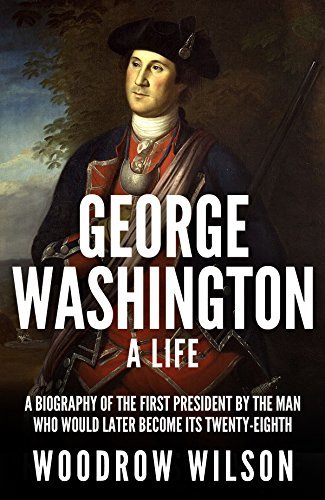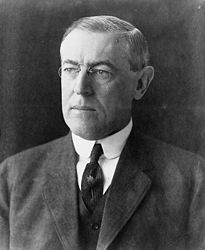
George Washington was one of the greatest leaders the United States has ever seen. Leading the Continental Army to victory over the British and playing a key role in forging the United States Constitution he has justly become known as “father of the country”. But where did he come from and how did he become such an instrumental figure in the history of America? This biography of the first President, written by a man who would later become the twenty-eighth, is an insightful look into the career of this famous soldier and politician. Woodrow Wilson’s book begins with a study into the Washington family and the Colony of Virginia under British rule that Washington grew up in. Washington’s life and career are analyzed step-by-step, from his childhood through to his first experience of military action fighting for the British against the French and their Indian allies, where he experienced his first taste of victory, but also that of defeat. Wilson covers Washington’s emergence into the heat of politics and the development of rising tensions with Great Britain. Through this period, Washington forged diplomatic relationships with various important leaders such as Thomas Jefferson and Richard Henry Lee, and with their support he emerged as a central figure in the fight for American independence and afterwards as the first President. George Washington: A Life is essential reading for anyone interested in finding more out about this intriguing figure who led the United States through many of its darkest moments and on to become one of the leading nations in the world. “Not only in absolute fidelity to the historical events and best traditions of the period covered, and to the facts of Washington’s life from first to last, has this book been written in a style peculiarly graceful, smooth and distinct—not only so, but withal in its pages there is an unconscious revelation of the author’s own personality.” John Kirby, The Methodist Quarterly Review “A spirited biography” Roscoe Brown, The Library of the World’s Best Literature Woodrow Wilson was the twenty-eighth President of the United States. Prior to becoming a politician he was an academic who wrote a number of books on history and politics. George Washington was his second work, published in 1896. He passed away after leading the States through World War One in 1924.
Author

Thomas Woodrow Wilson (1856-1924) was the twenty-eighth President of the United States. A devout Presbyterian and leading intellectual of the Progressive Era, he served as President of Princeton University and then became the Governor of New Jersey in 1910. With Theodore Roosevelt and William Howard Taft dividing the Republican Party vote, Wilson was elected President as a Democrat in 1912. He proved highly successful in leading a Democratic Congress to pass major legislation that included the Federal Trade Commission, the Clayton Antitrust Act, the Underwood Tariff, the Federal Farm Loan Act and most notably the Federal Reserve System. Wilson was a proponent of segregation during his presidency. Narrowly re-elected in 1916, his second term centered on World War I. He tried to maintain U.S. neutrality, but when the German Empire began unrestricted submarine warfare he wrote several admonishing notes to Germany, and eventually asked Congress to declare war on the Central Powers. He focused on diplomacy and financial considerations, leaving the waging of the war primarily in the hands of the military establishment. On the home front he began the first effective draft in 1917, raised billions through Liberty loans, imposed an income tax, set up the War Industries Board, promoted labor union growth, supervised agriculture and food production through the Lever Act, took over control of the railroads, and suppressed anti-war movements. He paid surprisingly little attention to military affairs, but provided the funding and food supplies that helped the Americans in the war and hastened Allied victory in 1918. In the late stages of the war he took personal control of negotiations with Germany, especially with the Fourteen Points and the armistice. He went to Paris in 1919 to create the League of Nations and shape the Treaty of Versailles, with special attention on creating new nations out of defunct empires. Largely for his efforts to form the League, he was awarded the Nobel Peace Prize in 1919. Wilson collapsed with a debilitating stroke in 1919, as the home front saw massive strikes and race riots, and wartime prosperity turn into postwar depression. He refused to compromise with the Republicans who controlled Congress after 1918, effectively destroying any chance for ratification of the Versailles Treaty. The League of Nations was established anyway, but the U.S. never joined. Wilson's idealistic internationalism, calling for the U.S. to enter the world arena to fight for democracy, progressiveness, and liberalism, has been a highly controversial position in American foreign policy, serving as a model for "idealists" to emulate or "realists" to reject for the following century.